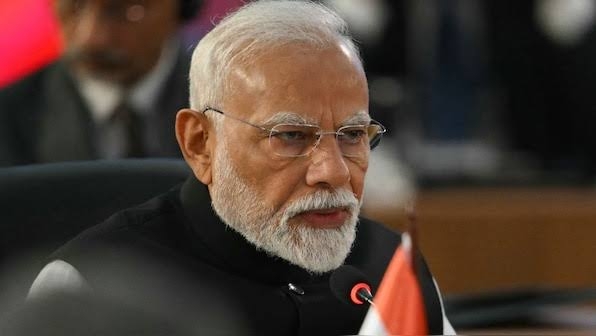At the BRICS Summit in Brazil, Prime Minister Narendra Modi made a compelling case for urgent reforms in global institutions, including the United Nations Security Council (UNSC), World Trade Organisation (WTO), and international financial bodies, stating that these organisations no longer reflect contemporary global realities.
Using a striking analogy, he said, “You can’t run 21st-century software on 20th-century typewriters.”
Addressing a session on global governance, Modi criticized the marginalization of the Global South, highlighting that nations making significant contributions to the world economy remain excluded from key decision-making platforms.
He said, “Two-thirds of humanity lacks proper representation in these outdated institutions,” and stressed the need for credible, effective reforms that are more than symbolic.
Modi argued that without inclusive participation, global bodies are ineffective in dealing with today’s challenges—from conflicts and pandemics to economic crises and cyber threats. He likened such institutions to “a mobile phone with a SIM card but no network.”
The BRICS Summit, attended by leaders from emerging economies, began with a family photo and a keynote from Brazilian President Luiz Inácio Lula da Silva, who echoed concerns about the breakdown of multilateralism.
Modi asserted that India remains committed to humanity-first policies and constructive engagement within BRICS. He said the bloc’s expansion shows its adaptability and urged similar momentum for institutional reforms to ensure a multipolar, inclusive world order.














 trophy alone.
#Djokovic #CarlosAlcaraz #AusOpen2026 #PrizeCeremony #TennisRivalry WittyDjoker GOATBanter NextTime TennisHumor' data-src='https://scontent-bom5-2.cdninstagram.com/v/t51.71878-15/625372549_1243070177758251_6631723537672399672_n.jpg?stp=dst-jpg_e35_tt6&_nc_cat=102&ccb=7-5&_nc_sid=18de74&efg=eyJlZmdfdGFnIjoiQ0xJUFMuYmVzdF9pbWFnZV91cmxnZW4uQzMifQ%3D%3D&_nc_ohc=MtYXUG8f_ToQ7kNvwFnYquX&_nc_oc=AdkhOE7lIpg9Nt6R3BrDclt1JZqxsO4qYDP0PiJes0xknnQIsuJfoSOSrybjT6k2uvlZdOOchdNwQo3sICZAk8cP&_nc_zt=23&_nc_ht=scontent-bom5-2.cdninstagram.com&edm=ANo9K5cEAAAA&_nc_gid=1liYTyQXfeXqvZiXNvpJYA&oh=00_AfumEB_9vCbSfTLClzSS9sDAY7GdC6B0VqkQMY7ZeEfz4A&oe=69864F4F' title='Carlos grabs AO 2026, but Djoker's mic drop? "We've got so much tennis left—see you at the next one!" 😂
Legends laughing together > trophy alone.
#Djokovic #CarlosAlcaraz #AusOpen2026 #PrizeCeremony #TennisRivalry WittyDjoker GOATBanter NextTime TennisHumor'>
trophy alone.
#Djokovic #CarlosAlcaraz #AusOpen2026 #PrizeCeremony #TennisRivalry WittyDjoker GOATBanter NextTime TennisHumor' data-src='https://scontent-bom5-2.cdninstagram.com/v/t51.71878-15/625372549_1243070177758251_6631723537672399672_n.jpg?stp=dst-jpg_e35_tt6&_nc_cat=102&ccb=7-5&_nc_sid=18de74&efg=eyJlZmdfdGFnIjoiQ0xJUFMuYmVzdF9pbWFnZV91cmxnZW4uQzMifQ%3D%3D&_nc_ohc=MtYXUG8f_ToQ7kNvwFnYquX&_nc_oc=AdkhOE7lIpg9Nt6R3BrDclt1JZqxsO4qYDP0PiJes0xknnQIsuJfoSOSrybjT6k2uvlZdOOchdNwQo3sICZAk8cP&_nc_zt=23&_nc_ht=scontent-bom5-2.cdninstagram.com&edm=ANo9K5cEAAAA&_nc_gid=1liYTyQXfeXqvZiXNvpJYA&oh=00_AfumEB_9vCbSfTLClzSS9sDAY7GdC6B0VqkQMY7ZeEfz4A&oe=69864F4F' title='Carlos grabs AO 2026, but Djoker's mic drop? "We've got so much tennis left—see you at the next one!" 😂
Legends laughing together > trophy alone.
#Djokovic #CarlosAlcaraz #AusOpen2026 #PrizeCeremony #TennisRivalry WittyDjoker GOATBanter NextTime TennisHumor'>













